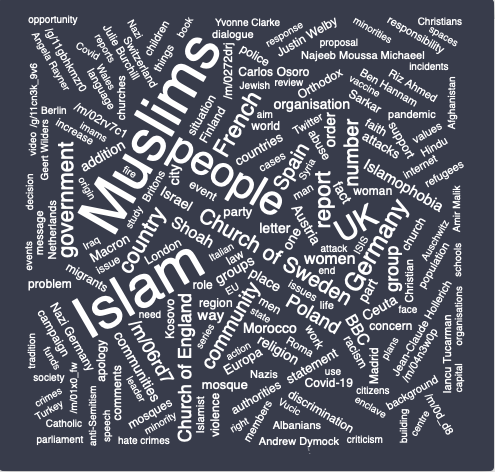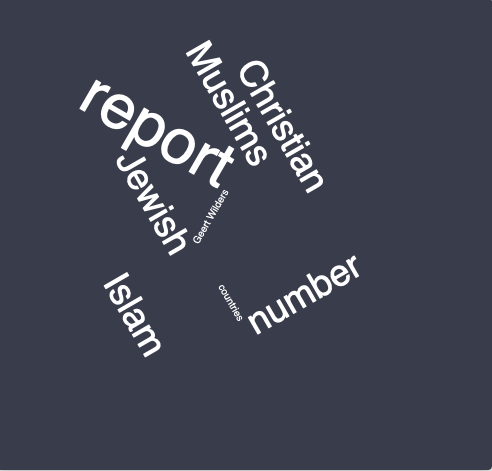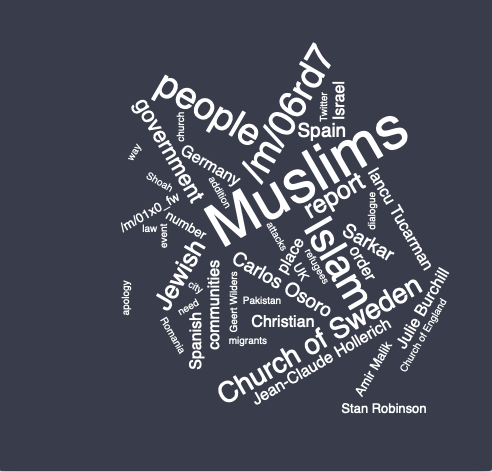Insights from the dashboard: Religion and ethnicity
Insights from the dashboard: Religion and ethnicity
While attacks on Muslims and Jews continue to take place in Europe, several religious communities value collaboration and coexistence. What role do ethnicity and religion play for both intolerance and greater collaboration?
Between 1 January and 31 August 2021, 2669 articles were added to the EARS dashboard. 140 articles, 5% of the total, have ethnicity as one of their keywords. As the following picture shows, two major topics here were ‘Muslims’ and ‘Islam’.

The articles concerning the topic of ethnicity show two opposing trends. On the one hand, many religious communities value the dialogue between different religions and work together to increase tolerance. On the other hand, while tolerance increases among religious communities, there have been a number of cases of intolerance and inequality. Let us look at articles on the dashboard that contain the keywords ethnicity and inequality, and ethnicity and tolerance respectively, to better understand these two opposites.
Are inequality and intolerance on the rise?
When researching articles that contain both the keyword ethnicity and inequality, the Dashboard finds 13 articles, with the following main topics:

According to the articles, there have been several cases of intolerance and inequality connected to religion and ethnicity. Muslims seem to be especially exposed. For example, in the Netherlands, the far-right wishes to ban immigration from Muslim countries and stop the construction of mosques.[1] In Germany, the number of attacks towards Muslims increased in 2020.[2] In Parma, northern Italy, Muslims are forced to pray outside since the Islamic centre was closed. This happened when the regional board decided to delete the Islamic community of the province of Parma from the list of associations promoting social activities.[3]
Religion in general seems to have become a ground for discrimination. In Finland, 34 reports to the Non-Discrimination Ombudsman were connected to religious discriminations. Among these, there were cases of antisemitism and Islamophobia.[4] In Sweden, a report shows that women born outside of Sweden and wearing religious covering experience serious difficulties on the job market.[5] According to these examples, then, religion and ethnicity seem to be a ground for discrimination.
Is Europe becoming more tolerant?
The number of articles containing both ethnicity and tolerance are 35, which is 1% of all articles added to the Dashboard between 1 January and 31 August 2021. ‘Muslims’ and ‘Islam’ are two of the major topics in this case as well.

A major trend that these articles show is a strong focus on interreligious dialogue. The ‘House of One’ project in Berlin, Germany, has received the support of both German politicians and international organisations.[6] In Spain, bishops encourage the dialogue between different religions, while showing solidarity and fraternity to the Muslim communities in the country.[7] [8] In the United Kingdom, the Church of England is working to tackle racism in its own ranks.[9]
Despite this awareness, hate crimes against both Muslims and Jews continue to take place. Attacks against Muslims have increased in Germany during 2020.[10] Similarly, a Swedish report shows that anti-Islamic incidents can take many different shapes depending, for example, on the different contexts and the gender of the victims.[11] When it comes to antisemitic attacks, they seem to be connected, among other things, to conspiracy theories about COVID-19, as is the case in Switzerland.[12] On other occasions, antisemitic attacks are connected to the Israeli-Palestinian conflict.[13] Finally, political slogans from far-right parties seem to include attacks against both Muslims and Jews.[14]
Is Europe tolerant or intolerant?
The articles published on the Dashboard between 1 January and 31 August 2021 under the keyword ethnicity in combination with inequality and tolerance respectively show an increased awareness for discrimination based on ethnicity and religion. While contemporary events play a role in the attacks on, for example, Jews and Muslims, different religious communities work to deepen the religious dialogue between them. Although inequality and discrimination based on religious and ethnical grounds still exist in society, religious communities seem to show a way forward towards tolerance and coexistence.
Learn more
The EARS dashboard allows you to gain insight into a large number of topics, including gender and tolerance. It is a free tool that enables you to make similar connections as described above, and to find out about new relationships between interesting subjects across Europe. Please visit the dashboard to learn more.
Sources
[1] Deklarata e deputetit ekstremist holandez shkakton debate: Ndaloni Islamin dhe Ramazanin, nuk janë e ardhmja jonë
[2] Deutschland: Zahl der Übergriffe auf Muslime erneut gestiegen
[3] Parma, islamici senza moschea pregano all’aperto. “Serve una soluzione urgente”
[4]Yhdenvertaisuusvaltuutettu sai viime vuonna 34 yhteydenottoa, jotka koskivat uskontoa tai vakaumusta
[5] Ny rapport: Många hinder för unga utrikes födda kvinnor på arbetsmarknaden
[6] House of One: Berlin lays cornerstone for a place for religious understanding
[7] Carlos Osoro: “El diálogo interreligioso busca establecer la amistad y la armonía sobre la base de unos valores compartidos”
[8] Los obispos españoles envían un mensaje de fraternidad a las comunidades musulmanas por el Ramadán
[9] Clergy speak out over ‘racism in Church of England’
[10] Deutschland: Zahl der Übergriffe auf Muslime erneut gestiegen
[11] Islamofobiska hatbrott yttrar sig i många olika former | Brå
[12] Covid lockdown fuels online anti-Semitism – SWI swissinfo.ch
[13] UK PM Johnson: Britain’s Jews should not have to endure ‘shameful racism’
[14] Spanish prosecutors probe hate speech against Muslims, Jews






